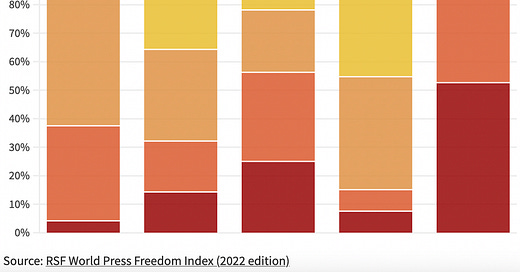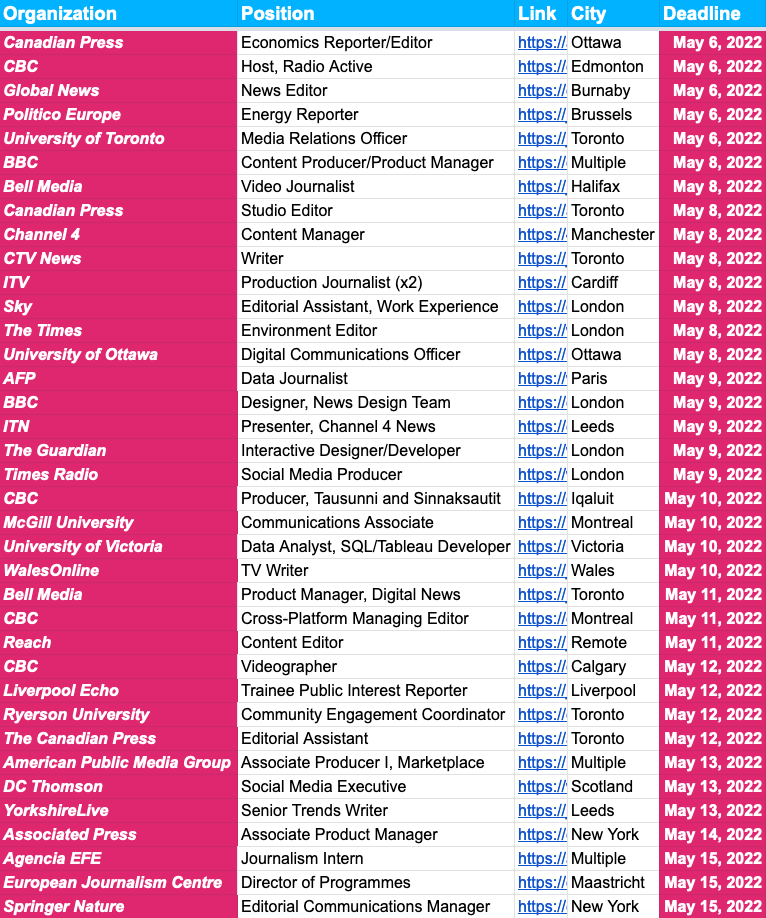✍️✍️ Deadlines and Press Freedom ✍️✍️ — May 6
New deadlines plus thoughts on world press freedom in 2022
Hello folks! As ever, happy Friday and hope we all had good weeks! I got back from my softball tournament in Prague and am still feeling the full effects. God damn being old sucks.
In more serious news, Tuesday marked World Press Freedom Day, and the global picture is pretty darn bleak. According to Reporters Without Borders, there’s been “a two-fold increase in polarisation amplified by information chaos – that is, media polarisation fuelling divisions within countries, as well as polarisation between countries at the international level.”
I’ve written down my two cents on the issue, including how to combat sneaky and not-so-sneaky governments and bad actors. You can find that below this week’s deadlines.
Speaking of which, today marks the deadline for our featured job: a remote Associate Editor position at Project Syndicate. And be sure to check out Monday’s new jobs update, where we added another boatload of new openings.
Lastly, you can read last week’s Q&A with Isaac Saul on how he built Tangle News from scratch into a politics must-read, his thoughts on overt media bias and how the biggest political problems cause the biggest anxiety and burnout.
Okay, time for deadlines and world press freedom thoughts. We’ll do it all again next week. Ciao! 👋
🚨 Featured Postings 🚨
✍️ Want to have a job featured? Fill out this form and we’ll help you out ✍️
🇺🇸🇺🇸🇺🇸
Project Syndicate
Location: Remote
Deadline: May 6
Preview of Upcoming Deadlines 🇬🇧🇨🇦🇺🇸🇪🇺
Press Freedom in 2022
We’re spoiled for choice with what example of repression to lead off with. The obvious pick is what’s happening in Ukraine right now, where 23 journalists have been killed, according to the Ukrainian National Union of Journalists. Agonizingly close encounters, like the one between Russian Forces and a team at Sky News, mean the number of dead could easily be much higher.
Or we could point to the story of how press freedom in Myanmar was crushed in six months after last year’s military coup d’état. A decade transition to democracy and an emerging free press gone in an instant, and one that continues into 2022. We could use the deaths of nine journalists in Mexico already this year, or the ‘open season on media’ during protests across the U.S.
In total, more than 1,400 journalists have been killed since the first World Press Freedom Day in 1991. Many of those had their lives taken by their own governments or organized crime groups linked to political elites.
It’s important to remember that repression against journalists, regardless of death totals, isn’t a West vs the rest issue. Case in point: Germany (16th), Canada (19th), the UK (24th), France (26th), Spain (32nd) and the U.S. (42nd) all rank in the second tier of press freedom in the World Press Freedom Index 2022.
While far from the dangerously oppressive regimes that operate in the likes of Russia, China and Iran, 'Satisfactory' press freedom just doesn't hold up for a collection of governments who preach the importance of press freedom and democracy.
The notion that Western governments are unconditionally for press freedom is a lie we’re sold by these very governments. Thinking the solution falls solely on them is incredibly naive. Remember in 2013 when the UK’s intelligence agency GCHQ showed up at The Guardian’s office to ensure the hard drives leaked by Edward Snowden were destroyed with angle grinders and drills?
Instead, it falls on all of us, which it has largely done so throughout history with almost every other issue. But how and where does one start? While I don’t pretend to have concrete answers, I do know we have the means to start.
Fortunately we live in an era whose media ecosystem has never been more democratic. Whether it’s podcasts, videos or newsletter platforms like the one you’re reading right now, we need more folks creating their own journalism and content to create a better balance between independents and larger newsrooms that traditionally influence public discourse.
The media’s decentralization that’s taken place over the past decade and beyond certainly isn’t perfect. Most social media platforms, for example, took far too long to help us decipher fact from opinion. Now that they have, their vague policies of what constitutes misinformation will inevitably restrict crucial discussion and questioning of the most powerful institutions.
Whether we like it or not, everyone has a little journalist in them. So to censor or silence anyone is an act against press freedom.
Dan Hind captured this notion for openDemocracy, quoting UNESCO’s 1991 Windhoek Declaration, whose anniversary World Press Freedom Day falls on. It states:
by an independent press, we mean a press independent from governmental, political or economic control or from control of materials and infrastructure essential for the production and dissemination of newspapers, magazines and periodicals.
While it might not seem like it, I believe we’re turning a societal corner, becoming more tolerable to opinions and views we don’t wholly agree with. Last week’s Q&A guest Isaac Saul and his newsletter Tangle News is a prime example. And there are countless other independent creators attempting to rebuild the bridges between our differing opinions and perspectives
This doesn’t necessarily mean we all must start our own media company — though if you want help on how to do so I’m happy to offer ideas and advice. It also means educating ourselves and others of how press freedom and the media ecosystem actually works. Who better to listen to than someone who works in journalism and can also highlight its flaws?
I can’t tell you how many seeds I’ve planted with friends and acquaintances, and noticed how more open-minded they’ve become and open to challenging their own takes.
Anyway, that’s enough from me for now. So what about you? I’d love to hear your thoughts to round out my own views and perspectives. Until then see you folks again on Monday!





